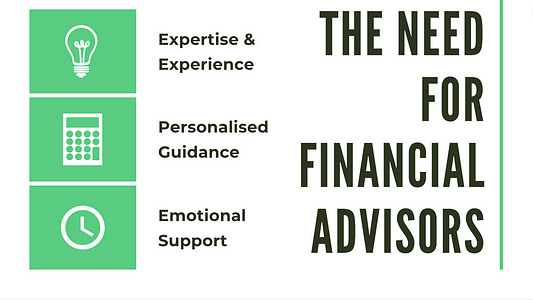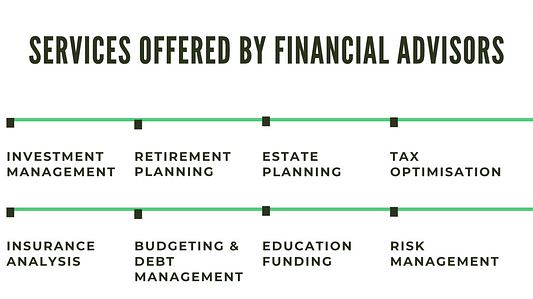Guidance on wealth management
In the g world of finance, navigating the path to financial success can be a daunting task.
From investing wisely to planning for retirement, managing your wealth requires a strategic approach.
This is where financial advisors step into the picture, serving as your trusted guides in achieving your financial goals.
In this article, we will look at the role of financial advisors, how to choose the right one, their fee structures, and the array of services they offer.
The Need For Financial Advisors
You might be wondering why you need a financial advisor.
After all, we live in an age where information is at our fingertips, and DIY (Do-It-Yourself) investing seems more accessible than ever.
While that is true that you can find a wealth of financial advice online, the value of a seasoned financial advisor cannot be overstated.

Expertise and Experience:
Financial advisors are trained and experienced professionals who have a deep understanding of the complex world of finance.
They keep up with market trends, tax laws, and investment strategies, offering you insights that can significantly impact your financial decisions.
Personalised Guidance:
No two financial situations are the same.
Financial advisors take the time to understand your unique goals, risk tolerance, and financial constraints.
With this information, they can create a tailored financial plan that suits your needs.
Emotional Support:
Emotions often cloud our judgment when it comes to money matters.
Financial advisors provide an objective perspective, helping you make rational decisions even in turbulent markets.
Choosing The Right Financial Advisor
Now that we have established the importance of financial advisors, let us discuss how to pick the right one.
Here are some essential factors to consider:
Credentials:
Look for credentials like Certified Financial Planner (CFP) or Chartered Financial Analyst (CFA).
These designations indicate a high level of expertise and professionalism.
Fiduciary Duty:
Ensure your advisor is a fiduciary, meaning they are legally obligated to act in your best interest.
This minimises conflicts of interest and ensures your financial well-being is your top priority.
Compatibility:
Building a strong working relationship with your advisor is crucial.
You should feel comfortable discussing your financial matters openly.
Trust your instincts, if it does not feel right, keep looking.
Fee Structure:
Financial advisors typically charge fees in one of three ways:
- Fee-Only:
These advisors charge a transparent fee for their services — often a percentage of your assets under management (AUM).
This structure aligns their interests with yours. - Commission-Based:
They earn commissions from the financial products they sell.
Be aware that this might create potential conflicts of interest — as they could recommend products that benefit them more than you. - Fee-Based:
Combining elements of both fee-only and commission-based models — these advisors charge fees for their services and may also receive commissions.
Ensure you understand the fee structure clearly.
Services Offered:
Financial advisors offer a wide range of services — including investment management, retirement planning, estate planning, tax optimisation, and more.
Make sure the advisor you choose can meet your specific needs.
Understanding Fee Structures
Financial advisor fees can vary widely, and it is essential to understand how they work to make informed decisions.
Percentage of Assets Under Management (AUM):
Many fee-only advisors charge a percentage of the assets they manage for you.
This fee structure is transparent and encourages advisors to grow your portfolio, aligning their interests with yours.
Fees typically range from 0.5% to 2% annually, depending on the advisor and the size of your portfolio.
Hourly or Flat Fees:
Some advisors charge hourly rates or flat fees for specific services.
This can be advantageous if you need help with a particular financial issue — like creating a budget or reviewing an insurance plan.
Commissions:
Advisors who earn commissions are compensated when they sell financial products like insurance policies or mutual funds.
While this can sometimes lead to conflicts of interest, it is crucial to understand how much commission they will earn and whether the recommended product genuinely suits your needs.
Retainer Fees:
A retainer fee involves paying an advisor an ongoing fee for their financial planning services.
This structure can be helpful if you need continuous advice on various financial matters.
Performance-Based Fees:
Some advisors charge fees based on your portfolio’s performance.
Be cautious with this structure — as it can incentivise risky investments to boost their compensation.
Services Offered By Financial Advisors
The services provided by financial advisors can be diverse, depending on their expertise and your needs.
Here are some common services you can expect:

Investment Management:
This includes creating a diversified portfolio, making investment decisions, and regularly rebalancing to maximise returns while managing risk.
Retirement Planning:
Advisors help you set goals, estimate retirement expenses, and create a plan to ensure you have the financial security you need in your golden years.
Estate Planning:
Planning for the distribution of your assets after your passing is crucial.
Financial advisors can assist in minimising estate taxes and ensuring your wishes are met.
Tax Optimisation:
Advisors help you structure your finances to minimise tax liabilities while staying within the bounds of tax laws.
Insurance Analysis:
Assessing your insurance needs and finding appropriate policies to protect your financial future.
Budgeting & Debt Management:
Advisors can assist in creating a budget and developing strategies to manage debt effectively.
Education Funding:
Planning for your children’s education expenses, whether it is college or other educational pursuits.
Risk Management:
Evaluating and mitigating financial risks — including market volatility and economic downturns.

In conclusion, it is clear that the role of a financial advisor is indispensable.
Their expertise, personalised guidance, and emotional support can make a significant difference in your financial journey.
When choosing an advisor, consider their credentials, fiduciary duty, compatibility, fee structure, and the range of services they offer.
Happy investing!
If you would like to know more about finance and investing, feel free to check out the following list:
Finance and Investing
As always, if you have any other questions or thoughts, please feel free to add them to the responses section.
If you would like to stay connected, check out my website or follow me on my socials: Linkedin & Instagram.
This article is for informational purposes only. It should not be considered Financial or Legal Advice. Not all information will be accurate. Consult a financial professional before making any major financial decisions.

